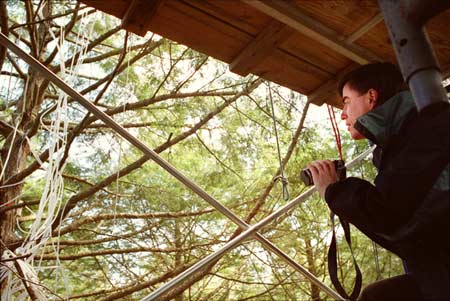The Big Picture
David Foster, Ecologist

Hiking to the far reaches of his classroom and laboratory – 3,000 wooded acres in Petersham – Harvard Forest director David Foster stops to admire a small plot of trees that have been pulled down by researchers to simulate the effect of a hurricane.
“New England gets hit every 50 to 100 years by a big hurricane,” he explains, adding that the last one, in 1938, felled 70 percent of New England’s hardwood forest.
Hang on there: Foster – ecologist, author of a book on Thoreau, outdoor enthusiast – he’s knocking trees down? In his plaid shirt, hiking boots, and deep-green parka, he looks the part of tree-hugger, not tree-tugger.
Yet whether in the name of research – the hurricane simulation will demonstrate the forest’s natural capacity to recover, which has implications for the logging industry – or preservation, saving every tree is not realistic or even desirable, says Foster.
“We still are living this lie that resources are endless,” he says, noting that while Massachusetts is saving its own trees, the state consumes lumber imported from forests elsewhere in the world. Cutting wood from our own backyard – responsibly and sustainably, of course – might powerfully connect consumptive behavior with its consequences.
Linking people with the landscape is a major focus of Foster’s and of research at the Harvard Forest. As dioramas at the forest’s Fisher Museum illustrate, the New England landscape has been altered dramatically at the hands of humans; its current level of forestation is far greater than it was several centuries ago, when our forebears stripped the land for their farms.
Under Foster’s direction since 1983, the forest has become a laboratory not just for the usual suspects – the departments of Organismic and Evolutionary Biology and of Earth and Planetary Sciences – but also for environmental policy researchers from the Kennedy School of Government, landscape architects from the Graduate School of Design, and ethicists from the Divinity School. “Ideally, it’s a hub of activity that brings together people from many different departments working on research projects,” Foster says.
Foster’s own background – he studied religion and biology as an undergraduate before getting a Ph.D. in ecology – puts him on firm footing to explore the nexus of humans and nature.
“Since this is a landscape that’s completely shaped by the interaction of people and natural process, you really have to understand both what people are doing and what’s motivating them,” he says.
We serve the public interest! Interesting people, interesting jobs, interesting hobbies – we want them in the Big Picture. If you have an idea for the Big Picture, give us a buzz at big_picture@harvard.edu




